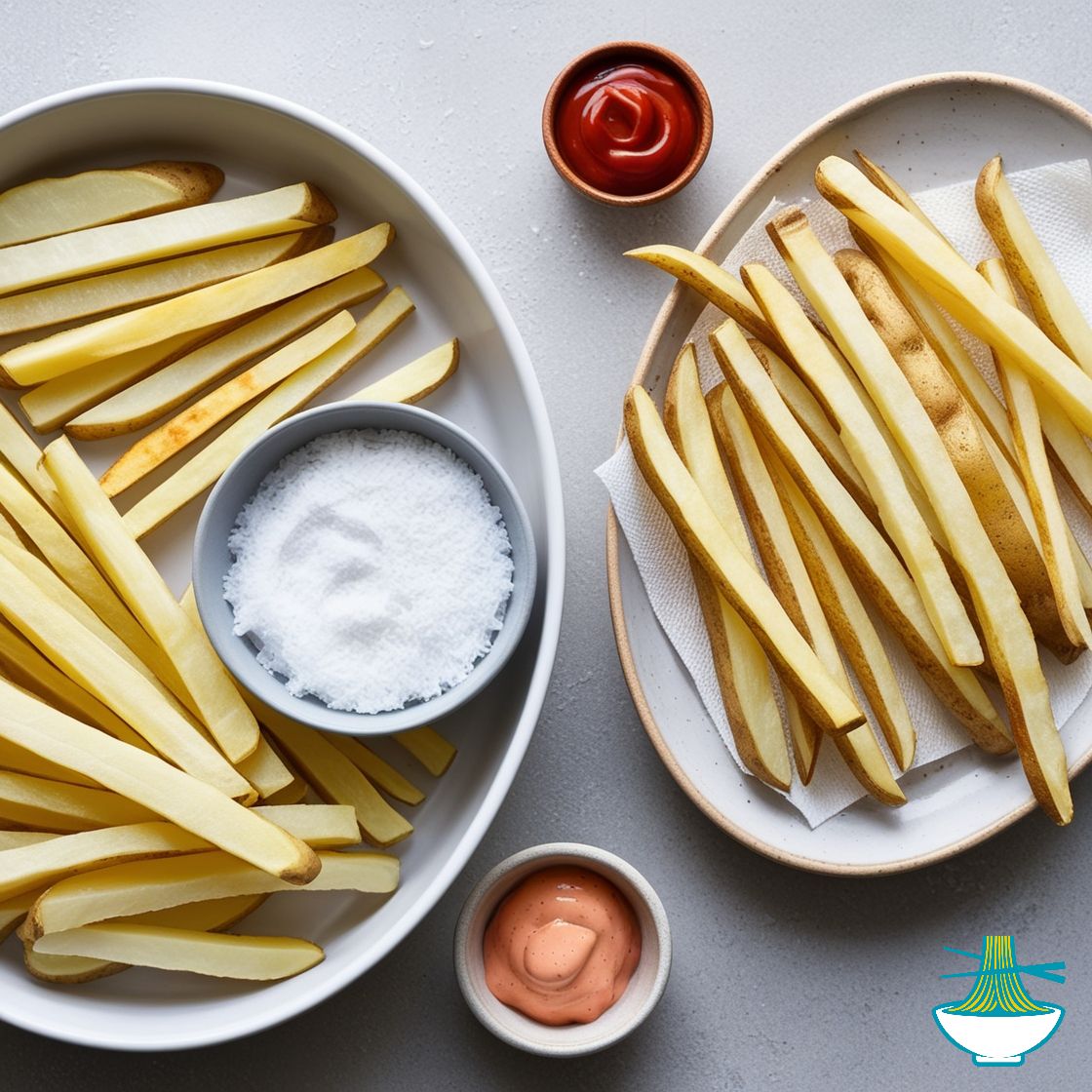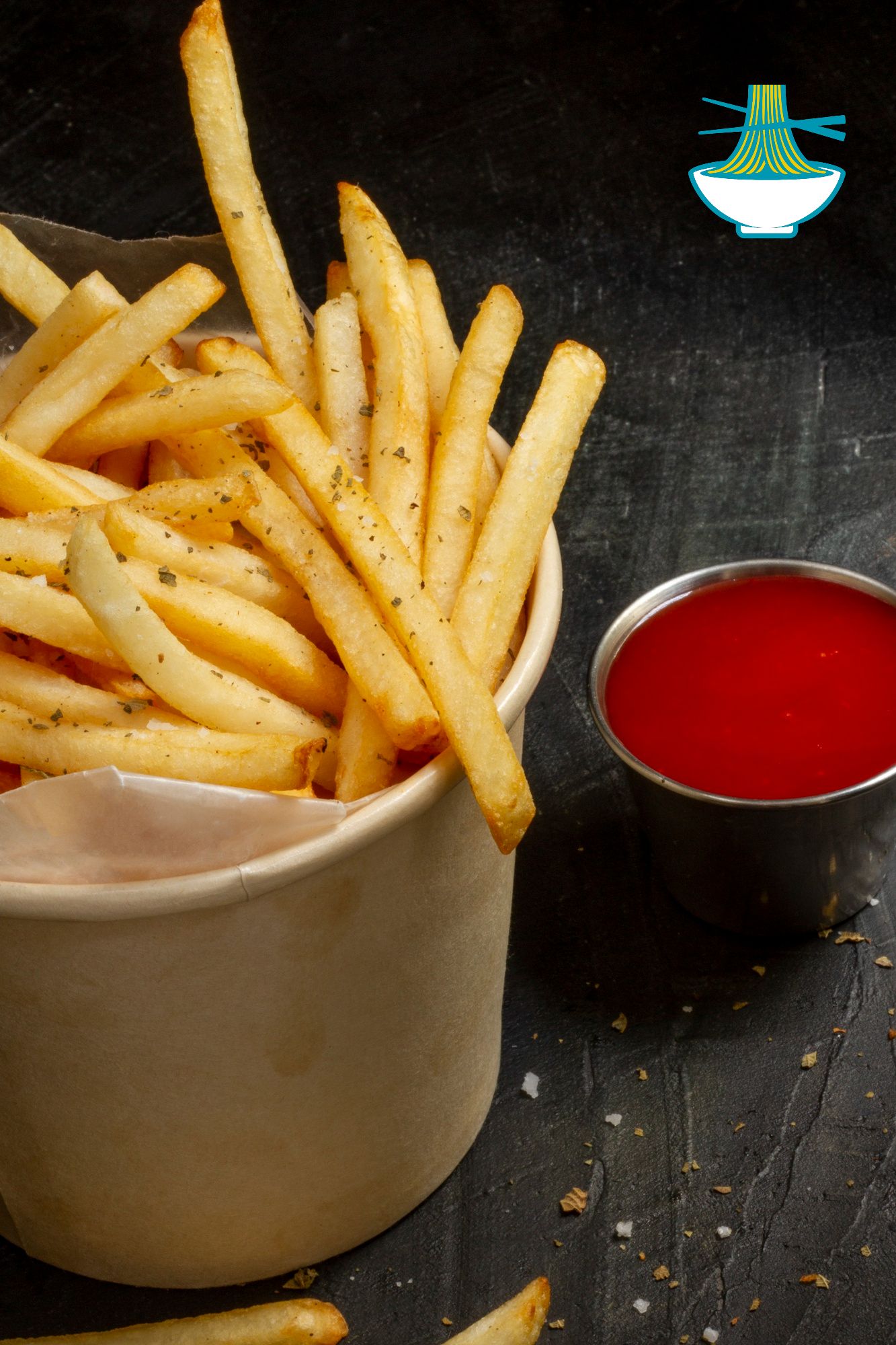Belgian fries, also known as Belgian frites, are a quintessential part of Belgian cuisine, loved for their unique texture and delicious taste. Made from thinly sliced potatoes that are fried twice, these fries boast a crispy exterior and a soft, fluffy interior. They are often served with an array of sauces, including mayonnaise, ketchup, and aioli, making them a versatile and beloved dish both in Belgium and worldwide.

The history of Belgian fries dates back to the late 17th century. According to Belgian folklore, the inhabitants of the Meuse Valley, who typically fried small fish caught in the river, began frying potato strips when the river froze over and fish were scarce. This method of double-frying potatoes quickly gained popularity and became a staple of Belgian street food culture. Over the years, Belgian fries have evolved and are now considered a national treasure, enjoyed by locals and tourists alike at fritkots (fry shops) across the country.
Ingredients
- 4 large Russet potatoes
- Vegetable oil (or peanut oil)
- Salt

Instructions
1. Prepare Potatoes:
- Peel the potatoes and cut them into long, thin strips, about 1/4 inch wide.
- Rinse the potato strips in cold water to remove excess starch, then dry them thoroughly with paper towels.
2. First Fry:
- Heat the vegetable oil in a deep fryer or a large pot over medium-high heat until it reaches 325°F (163°C).
- Fry the potato strips in small batches for about 4-6 minutes, or until they are lightly golden brown.
- Remove the fries from the oil with a slotted spoon and let them drain on paper towels.
3. Second Fry:
- Increase the heat of the oil to 375°F (190°C).
- Fry the potato strips again in small batches for about 1-2 minutes, or until they are crispy and golden brown.
- Remove the fries from the oil and let them drain on paper towels.
4. Season and Serve:
- Sprinkle the fries with salt to taste.
- Serve immediately with your favorite dipping sauces, such as mayonnaise, ketchup, or aioli.
Notes
1. Drying Potatoes: Ensure the potato strips are thoroughly dried after rinsing to prevent soggy fries and ensure even frying.
2. Avoid Overcrowding: Fry in small batches to maintain the oil temperature and achieve crispier fries.
3. Healthier Option: For a lighter version, bake the potato strips in the oven. Toss them in a small amount of oil and bake at 400°F (200°C) for 20-25 minutes, or until crispy and golden brown.
By following these steps, you can enjoy authentic Belgian fries with the perfect balance of crispiness and fluffiness, just like those found in Belgium's famed fritkots.

Nutrition Value:
Here are the approximate nutritional values for the listed ingredients:
1. Potatoes (4 large, raw, skin-on)
Nutritional Information (Approximate Values)
- Calories: 1060
- Carbohydrates: 240g
- Fiber: 32g
- Protein: 28g
- Fat: 0g
- Vitamin C: 240mg (267% DV)
- Vitamin B6: 2.4mg (141% DV)
- Potassium: 7040mg (150% DV)
- Magnesium: 192mg (46% DV)
- Iron: 10mg (56% DV)
Benefits
- Vitamin C: Important for immune function and skin health.
- Vitamin B6: Essential for brain health and metabolism.
- Potassium: Vital for heart health and muscle function.
- Fiber: Aids in digestion and may help with weight management.
Health Risks and Harms
- High Glycemic Index: Potatoes can raise blood sugar levels quickly, which may be a concern for individuals with diabetes.
- Solanine Content: If potatoes are green or sprouted, they can contain solanine, a toxic compound that can cause gastrointestinal distress and neurological problems.
- Caloric Density: High in calories, which can contribute to weight gain if consumed in large quantities.
2. Vegetable Oil (Assuming 1 tablespoon for cooking)
Nutritional Information (Approximate Values)
- Calories: 120
- Total Fat: 14g
- Saturated Fat: 2g
- Polyunsaturated Fat: 8g
- Monounsaturated Fat: 4g
- Sodium: 0mg
- Potassium: 0mg
- Total Carbohydrates: 0g
- Protein: 0g
Benefits
- Healthy Fats: Includes omega-3 and omega-6 fatty acids, beneficial for heart health.
- Vitamin E: An antioxidant that helps protect cells from damage.
- Anti-Inflammatory: May help reduce inflammation in the body.
Health Risks and Harms
- High Caloric Content: High in calories, which can contribute to weight gain if not used in moderation.
- Saturated Fat: Can raise cholesterol levels, potentially increasing the risk of heart disease.
- Oxidation: Certain vegetable oils can oxidize when heated, producing harmful compounds.
3. Salt (Assuming 1 teaspoon)
Nutritional Information (Approximate Values)
- Sodium: 2300mg (100% DV)
Benefits
- Fluid Balance: Essential for maintaining proper fluid balance in the body.
- Nerve Function: Plays a role in nerve function and muscle contractions.
- Nutrient Absorption: Helps with the absorption of certain nutrients, such as chloride.
Health Risks and Harms
- High Blood Pressure: Excessive sodium intake can lead to hypertension.
- Heart Disease: Increased risk of heart disease and stroke with high sodium intake.
- Kidney Function: Can impair kidney function and increase the risk of kidney stones.
Summary
- Belgian fries are a delicious treat but should be enjoyed in moderation due to their high calorie and fat content. Potatoes provide essential nutrients like vitamin C, vitamin B6, potassium, and fiber, offering several health benefits. However, their high glycemic index and potential solanine content pose risks. Vegetable oil adds healthy fats and vitamin E but can contribute to weight gain and heart disease if consumed excessively. Salt is necessary for bodily functions but should be limited to avoid health issues like high blood pressure and heart disease.
Please note that these values are approximate and can vary based on the specific type and brand of ingredients used.
Note: These values may vary depending on the cooking method and the type of oil used.


Comments